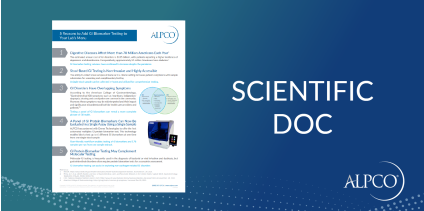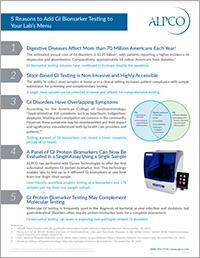April 20, 2023
5 Reasons to Add GI Biomarker Testing to Your Lab’s Menu
1. Digestive Diseases Affect More than 70 Million Americans Each Year1
The estimated annual cost of GI disorders is $135 billion2, with patients reporting a higher incidence of depression and absenteeism. Comparatively, approximately 34 million Americans have diabetes.3
GI biomarker testing volumes have continued to increase despite the pandemic.
2. Stool-Based GI Testing is Non-Invasive and Highly Accessible
Collecting stool samples at home or in a clinical setting increases patient compliance with sample submission for screening and complimentary testing.A single stool sample can be collected in-home and utilized for comprehensive testing.
3. GI Disorders Have Overlapping Symptoms
According to the American College of Gastroenterology, “Gastrointestinal (GI) symptoms such as heartburn, indigestion/dyspepsia, bloating and constipation are common in the community. However, these symptoms may be misinterpreted, and their impact and significance misunderstood both by health care providers and patients.”4Testing a panel of GI biomarkers can reveal a more complete picture of GI health.
4. A Panel of GI Protein Biomarkers Can Now Be Evaluated in a Single Assay Using a Single Sample
ALPCO has partnered with Dynex Technologies to offer the first automated multiplex GI protein biomarker test. This technology enables labs to test up to 6 different GI biomarkers simultaneously from one stool sample.User-friendly workflow enables testing of 6 biomarkers and 176 samples per run from one sample extract.
5. GI Protein Biomarker Testing May Complement Molecular Testing
Molecular GI testing is frequently used in the diagnosis of bacterial or viral infection and dysbiosis, but gastrointestinal disorders often require protein biomarker tests for a complete assessment.GI biomarker testing can assist in exploring non-pathogen-related GI disorders.
References- NIDDK. https://www.niddk.nih.gov/health-information/health-statistics/digestive-diseases. Accessed Dec. 28, 2021.
- Peery, A.F., et al. (2019). Burden and Cost of Gastrointestinal, Liver, and Pancreatic Diseases in the United States: Update 2018. Gastroenterology. 156(1):254-272.e11. PMID: 30315778.
- CDC. National Diabetes Statistics report, 2020. https://www.cdc.gov/diabetes/library/features/diabetes-stat-report.html. Accessed Dec. 28, 2021.
- American College of Gastroenterology. https://gi.org/topics/common-gi-symptoms/. Accessed Dec 28, 2021.


